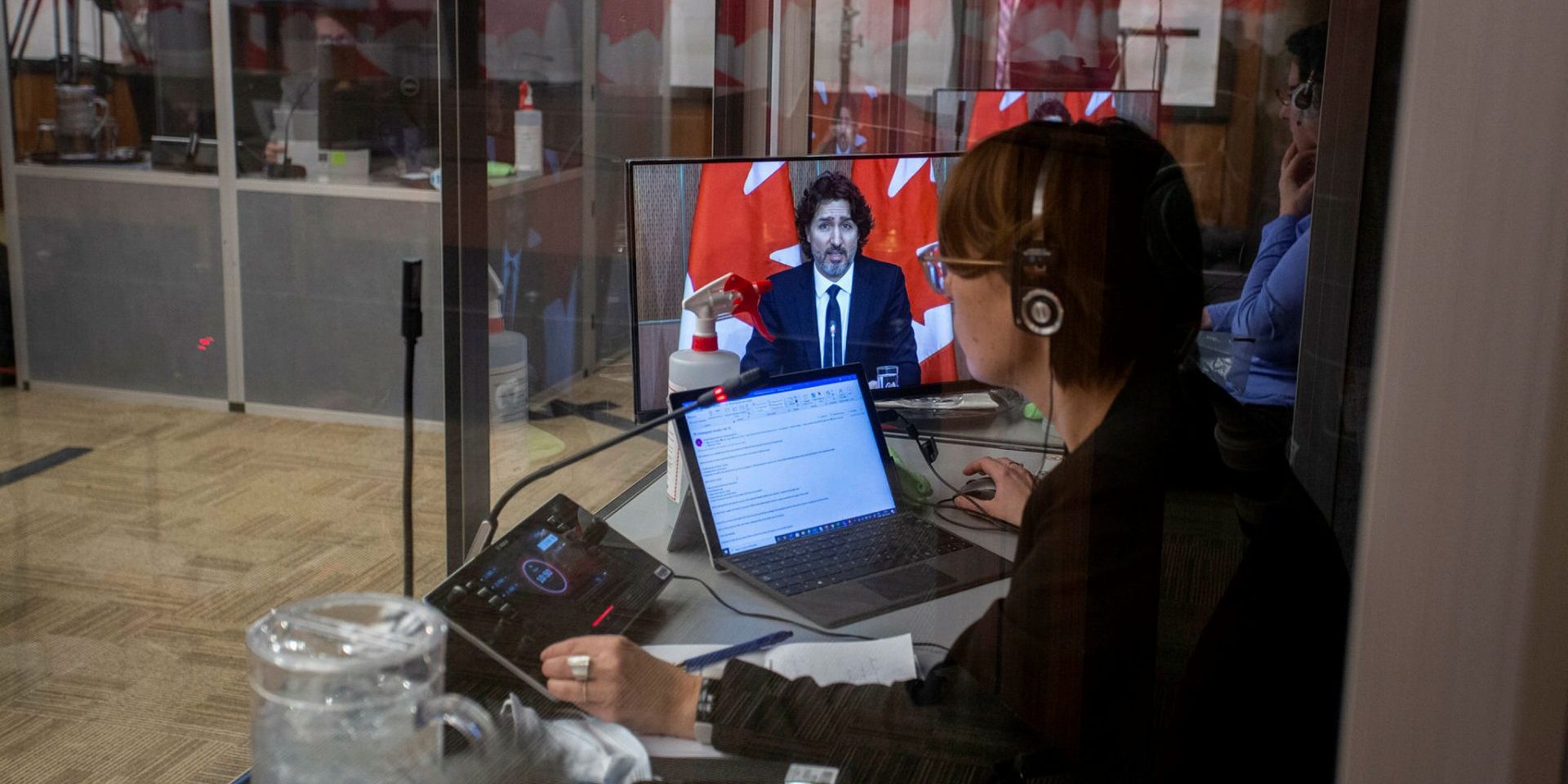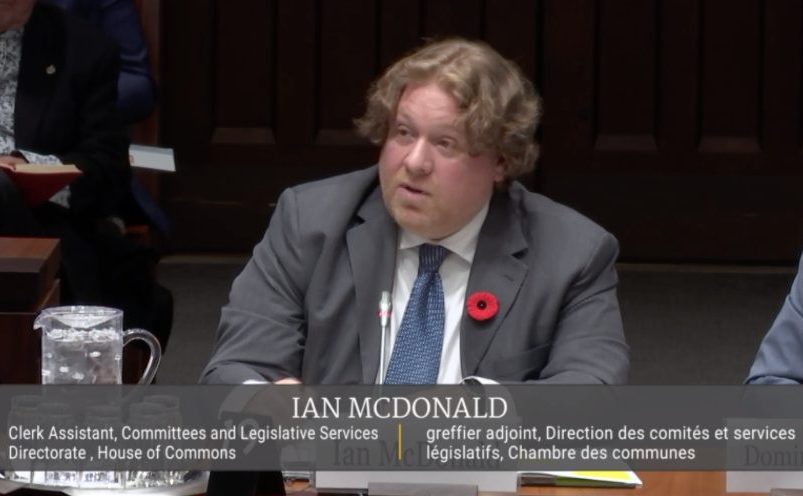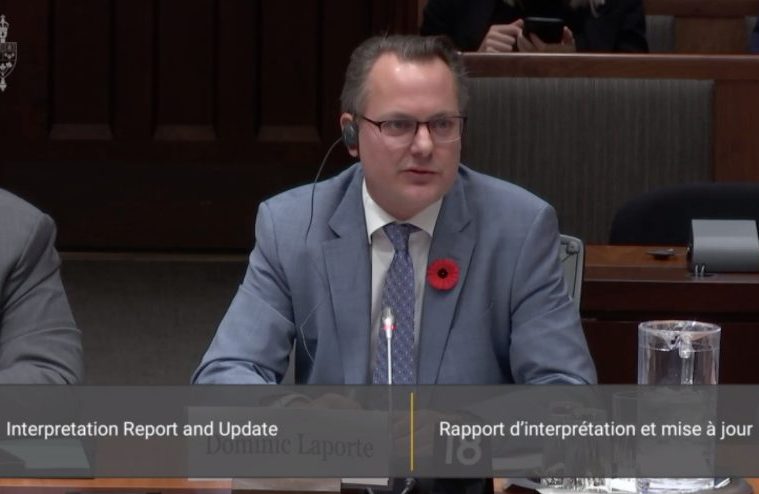Remote simultaneous interpretation now in use for House committees

As part of continuing efforts to increase the availability of interpretation services to Parliament, the House of Commons officially began phasing in use of a new remote simultaneous interpretation option for regular committee meetings this week.
Remote simultaneous interpretation (RSI), also referred to as dispersed mode interpretation, involves an interpreter working remotely, covering a parliamentary event from outside the physical meeting room or even the National Capital Region. A pilot project to test use of RSI with willing federally accredited interpreters was first approved by the House Board of Internal Economy (BOIE) in May 2022, but didn’t get underway until 2023.
To test the use of RSI services, the pilot only involved non-broadcast, non-parliamentary meetings, like regional caucus sit-downs or gatherings of interparliamentary groups, which have been starved of interpretation resources since the service came under strain following the switch to hybrid proceedings amid the COVID-19 pandemic. RSI services were piloted for the first time in April, and were used 19 times “with success,” House clerk assistant Ian McDonald told the Board on Nov. 9.

“Over the past few weeks, teams have also participated in simulations dealing with real committee meetings to make sure that everything works well technically, and that the requirements of the Translation Bureau are met,” said McDonald. “The objective is that this service be as transparent as possible for meeting participants.”
McDonald noted the House administration would be following up with respective party whips to agree on a schedule to “bring this service online for regular committee meetings,” with a proposed start date of Nov. 20. The recommendation prescribed a phased-in approach for introducing the RSI option, starting with one “regularly scheduled” committee meeting per day between Mondays and Thursdays.
“It is felt that the best option for the whips is to choose specific committees that will regularly use this service, this way the interpreters will be familiar with the committee and the content, and Members will more quickly become familiar with the service,” said McDonald. “In the coming weeks, a second RSI meeting would be planned on the same days to maximize the use of these new interpretation resources.”
Ultimately, he said, this will add two new committee meeting slots per day, or eight per week, up from 57 per week. Put another way, the RSI option will add 16 additional hours of interpretation service capacity to reach 176 hours per week, an increase of 10 per cent.
“Until the winter adjournment, it is recommended that this new capacity be used mostly to bring some needed flexibility to the existing committee schedule, and to help reduce cancellations due to meetings that require extra time, occasional extra meetings, late sittings of the House, and when available, to use the existing in-person teams to support other activities that have less access to interpretation resources at the present time, including regional caucus, interparliamentary and other events,” he said.
In highlighting the difference the new remote interpretation option would make, McDonald noted it, for example, would mean that on Thursdays when the Board meets, another House committee would no longer have to cancel a meeting to accommodate (if all regularly scheduled committees were aiming to meet that day), with the Procedure and House Affairs Committee having cancelled its regularly scheduled meeting that day in order for the Board to have interpretation services to meet.
The whips subsequently gave the recommendation the green light, and on Nov. 20, the RSI option began being phased-in, starting with an in-camera meeting of the House Official Languages Committee.
A confluence of factors have led to the ongoing shortfall in interpretation services to Parliament. Hybrid proceedings introduced in response to COVID-19 led to increased reports of injuries to interpreters, causing some to take leave or reduce their hours. Shift hours were also reduced writ large as part of precautionary measures implemented by the Translation Bureau in response to the spike in injuries. On top of that, even before the pandemic, the bureau reportedly struggled to offset the natural attrition of its workforce, with fewer people able to or interested in working for the bureau being hired than those who are retiring or otherwise leaving. In part, that reduced pool of new blood is tied to what the bureau has described as a world-wide interpreter shortage, but additionally, it’s noted that some qualified interpreters have declined working for the bureau because they did not want to relocate to the Ottawa area.
With RSI, interpreters accredited with the bureau will be able to cover parliamentary events from anywhere in Canada.
“We expect that there may be some little bumps along the way, but with our work so far [with the pilot] we’ve been able to make improvements already and sort out these little wrinkles and bumps,” said Matthew Ball, Public Services and Procurement Canada’s vice-president of service to Parliament and interpretation.
Accreditation exam outcomes
This year, as part of its bid to boost resources, the bureau introduced a second accreditation exam for prospective new interpreters which took place in June. Previously, only one such exam took place each year in the fall.
On Nov. 9, Board members also were given an update on the results of that exam. In all, 38 candidates sat the test, 11 of whom were returning candidates who had failed the previous exam in November 2022. Ultimately, four people passed, three of whom were Canadian candidates, and one of whom came from abroad. In response to a follow-up question from The Hill Times, PSPC media relations confirmed that one of the successful Canadian candidates who had already been working for the Translation Bureau in another capacity is now a new staff interpreter, while the other two have signed freelance contracts. “Discussions are ongoing with the successful foreign candidate,” wrote PSPC’s Michèle LaRose.

Asked what the bureau is doing to help improve the low success rate, CEO Dominic Laporte told MPs that his team is “working closely with candidates who were close to passing. We see that they have skills to really become Translation Bureau interpreters, so these people receive training from us because they know they’re close to making it.” He noted the bureau also offers “prep workshops for candidates.”
“We don’t want to trick them with an exam. Quite the opposite. We want to make sure they have the necessary skills to meet the very strict requirements that apply within the House. We don’t want to compromise on quality ever,” said Laporte.
The second accreditation exam for 2023 took place on Nov. 10, with 57 candidates signed up to take part.
The Hill Times






 LICENSING
LICENSING PODCAST
PODCAST ALERTS
ALERTS













